The Cambridge History of China. Vol. 13: Republican China 1912-1949, Part 2
Подождите немного. Документ загружается.

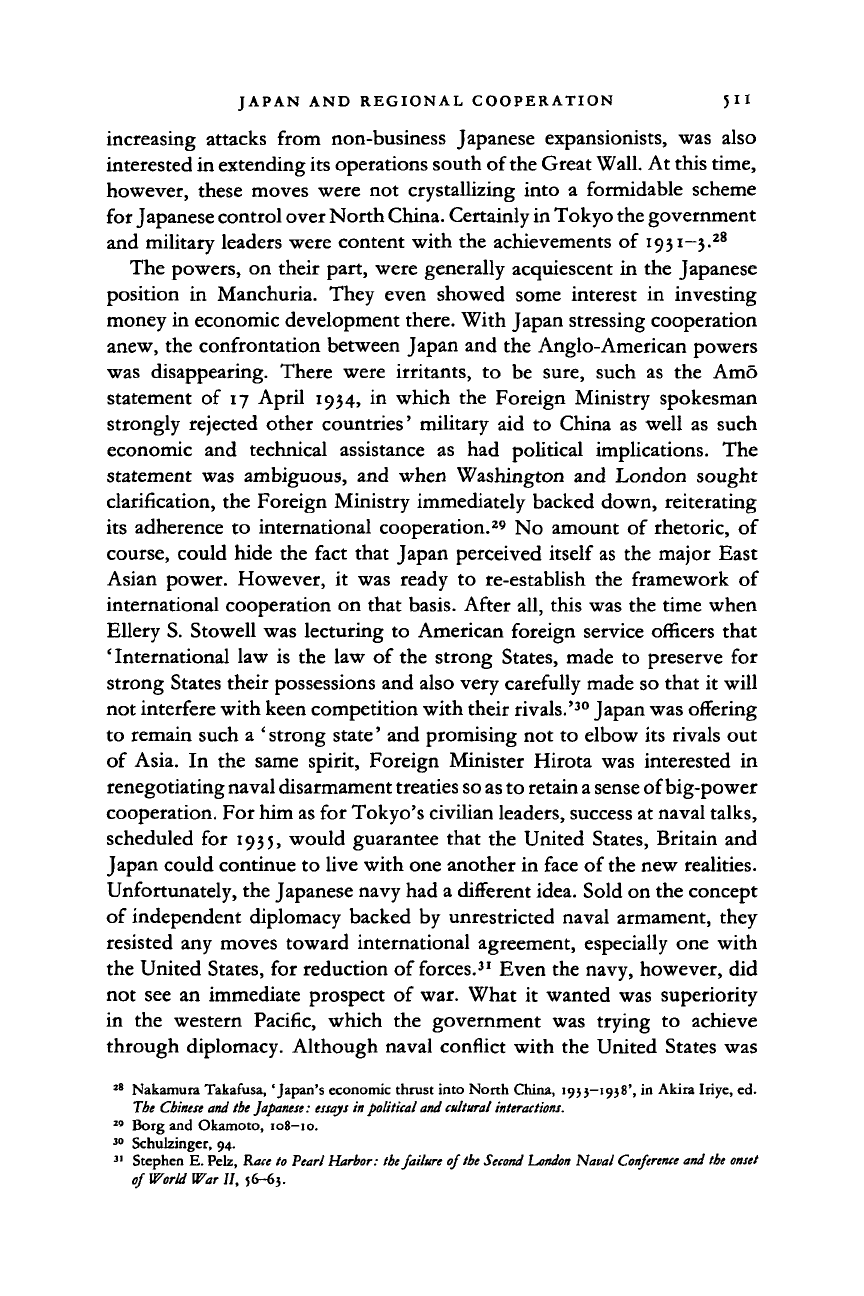
JAPAN AND REGIONAL COOPERATION JII
increasing attacks from non-business Japanese expansionists, was also
interested in extending its operations south of the Great
Wall.
At this time,
however, these moves were not crystallizing into a formidable scheme
for Japanese control over North
China.
Certainly in Tokyo the government
and military leaders were content with the achievements of 1931-3.
28
The powers, on their part, were generally acquiescent in the Japanese
position in Manchuria. They even showed some interest in investing
money in economic development there. With Japan stressing cooperation
anew, the confrontation between Japan and the Anglo-American powers
was disappearing. There were irritants, to be sure, such as the Amo
statement of 17 April 1934, in which the Foreign Ministry spokesman
strongly rejected other countries' military aid to China as well as such
economic and technical assistance as had political implications. The
statement was ambiguous, and when Washington and London sought
clarification, the Foreign Ministry immediately backed down, reiterating
its adherence to international cooperation.
29
No amount of rhetoric, of
course, could hide the fact that Japan perceived itself as the major East
Asian power. However, it was ready to re-establish the framework of
international cooperation on that basis. After all, this was the time when
Ellery S. Stowell was lecturing to American foreign service officers that
'International law is the law of the strong States, made to preserve for
strong States their possessions and also very carefully made so that it will
not interfere with keen competition with their rivals.'
30
Japan was offering
to remain such a 'strong state' and promising not to elbow its rivals out
of Asia. In the same spirit, Foreign Minister Hirota was interested in
renegotiating naval disarmament treaties
so as
to retain
a
sense of big-power
cooperation. For him as for Tokyo's civilian leaders, success at naval talks,
scheduled for 1935, would guarantee that the United States, Britain and
Japan could continue to live with one another in face of the new realities.
Unfortunately, the Japanese navy had a different idea. Sold on the concept
of independent diplomacy backed by unrestricted naval armament, they
resisted any moves toward international agreement, especially one with
the United States, for reduction of forces.
31
Even the navy, however, did
not see an immediate prospect of war. What it wanted was superiority
in the western Pacific, which the government was trying to achieve
through diplomacy. Although naval conflict with the United States was
28
Nakamura Takafusa, 'Japan's economic thrust into North China, 1933—1938', in Akira Iriye, ed.
The
Chinese
and the
Japanese:
essays
in political and cultural interactions.
"> Borg
and
Okamoto, 108-10.
30
Schulzinger,
94.
31
Stephen
E.
Pelz, Race
to
Pearl Harbor: the failure of the Second London Naval
Conference
and the
onset
of World
War
11,
56-63.
Cambridge Histories Online © Cambridge University Press, 2008
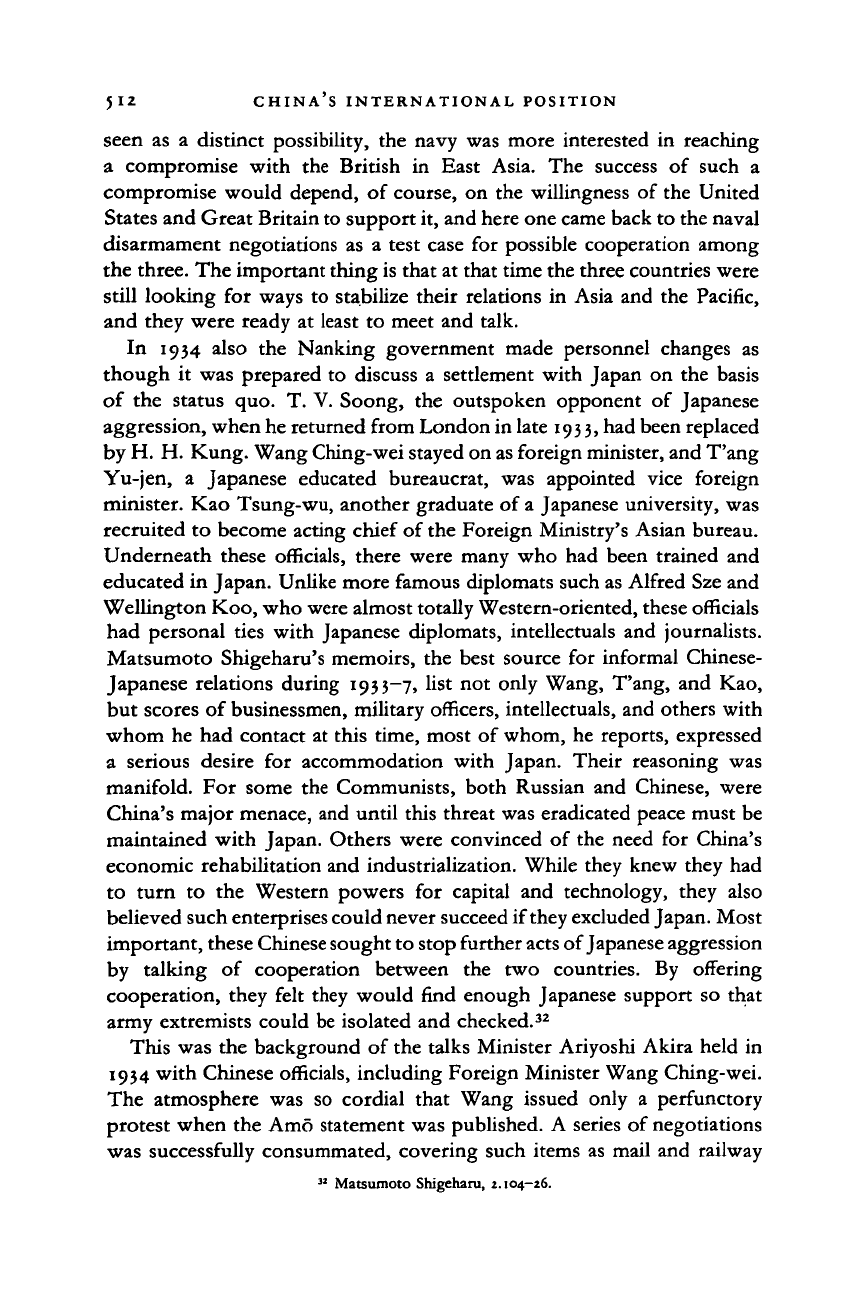
JI2 CHINA S INTERNATIONAL POSITION
seen as a distinct possibility, the navy was more interested in reaching
a compromise with the British in East Asia. The success of such a
compromise would depend, of course, on the willingness of the United
States and Great Britain to support it, and here one came back to the naval
disarmament negotiations as a test case for possible cooperation among
the three. The important thing is that at that time the three countries were
still looking for ways to stabilize their relations in Asia and the Pacific,
and they were ready at least to meet and talk.
In 1934 also the Nanking government made personnel changes as
though it was prepared to discuss a settlement with Japan on the basis
of the status quo. T. V. Soong, the outspoken opponent of Japanese
aggression, when he returned from London in late
1933,
had been replaced
by H. H. Kung. Wang Ching-wei stayed on as foreign minister, and T'ang
Yu-jen, a Japanese educated bureaucrat, was appointed vice foreign
minister. Kao Tsung-wu, another graduate of a Japanese university, was
recruited to become acting chief of the Foreign Ministry's Asian bureau.
Underneath these officials, there were many who had been trained and
educated in Japan. Unlike more famous diplomats such as Alfred Sze and
Wellington Koo, who were almost totally Western-oriented, these officials
had personal ties with Japanese diplomats, intellectuals and journalists.
Matsumoto Shigeharu's memoirs, the best source for informal Chinese-
Japanese relations during 1933—7, list not only Wang, T'ang, and Kao,
but scores of businessmen, military officers, intellectuals, and others with
whom he had contact at this time, most of whom, he reports, expressed
a serious desire for accommodation with Japan. Their reasoning was
manifold. For some the Communists, both Russian and Chinese, were
China's major menace, and until this threat was eradicated peace must be
maintained with Japan. Others were convinced of the need for China's
economic rehabilitation and industrialization. While they knew they had
to turn to the Western powers for capital and technology, they also
believed such enterprises could never succeed if they excluded Japan. Most
important, these Chinese sought to stop further acts of Japanese aggression
by talking of cooperation between the two countries. By offering
cooperation, they felt they would find enough Japanese support so that
army extremists could be isolated and checked.
32
This was the background of the talks Minister Ariyoshi Akira held in
1934 with Chinese officials, including Foreign Minister Wang Ching-wei.
The atmosphere was so cordial that Wang issued only a perfunctory
protest when the Amo statement was published. A series of negotiations
was successfully consummated, covering such items as mail and railway
32
Matsumoto Shigeharu, 2.104—26.
Cambridge Histories Online © Cambridge University Press, 2008
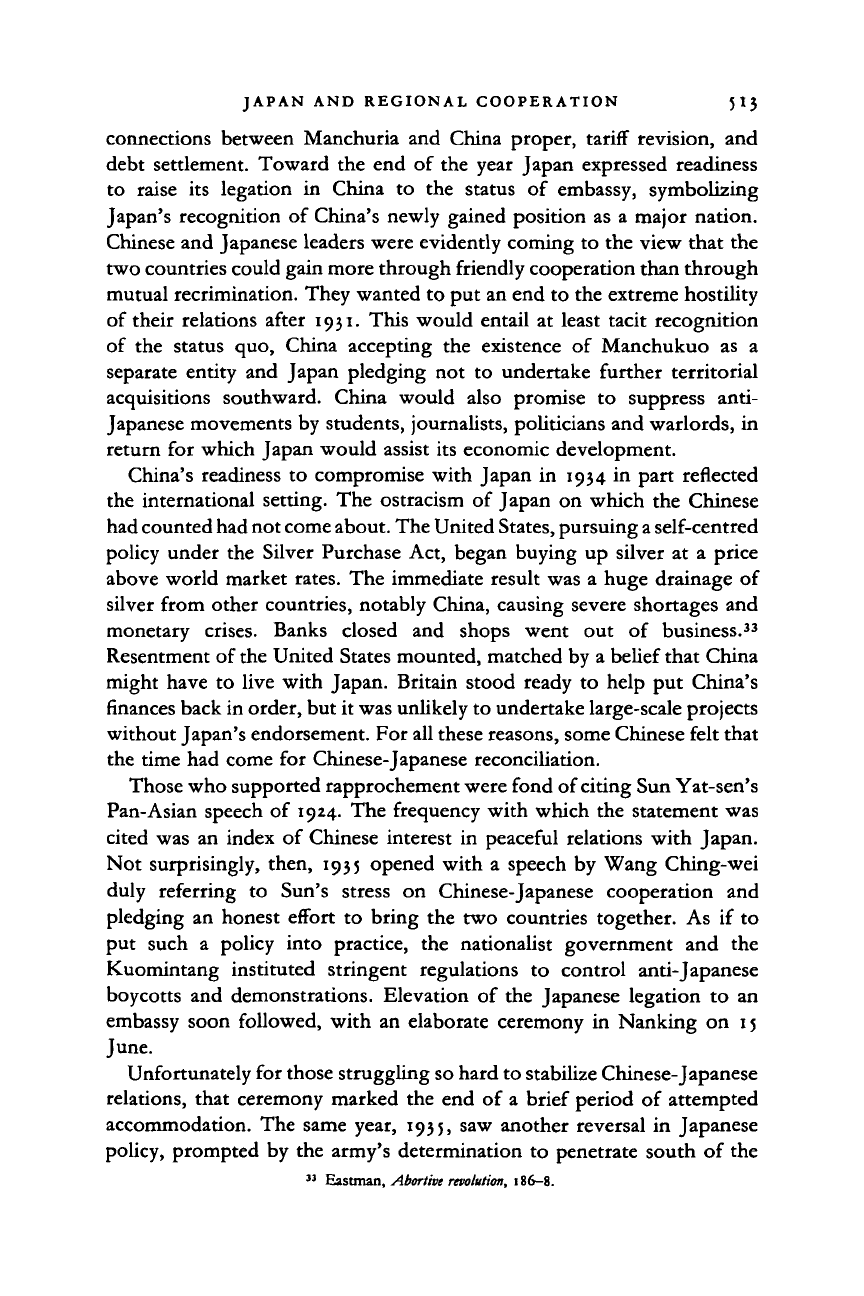
JAPAN AND REGIONAL COOPERATION 5I3
connections between Manchuria and China proper, tariff revision, and
debt settlement. Toward the end of the year Japan expressed readiness
to raise its legation in China to the status of embassy, symbolizing
Japan's recognition of China's newly gained position as a major nation.
Chinese and Japanese leaders were evidently coming to the view that the
two countries could gain more through friendly cooperation than through
mutual recrimination. They wanted to put an end to the extreme hostility
of their relations after 1931. This would entail at least tacit recognition
of the status quo, China accepting the existence of Manchukuo as a
separate entity and Japan pledging not to undertake further territorial
acquisitions southward. China would also promise to suppress anti-
Japanese movements by students, journalists, politicians and warlords, in
return for which Japan would assist its economic development.
China's readiness to compromise with Japan in 1934 in part reflected
the international setting. The ostracism of Japan on which the Chinese
had counted had not come
about.
The United States, pursuing
a
self-centred
policy under the Silver Purchase Act, began buying up silver at a price
above world market rates. The immediate result was a huge drainage of
silver from other countries, notably China, causing severe shortages and
monetary crises. Banks closed and shops went out of business.
33
Resentment of the United States mounted, matched by a belief that China
might have to live with Japan. Britain stood ready to help put China's
finances back in order, but it was unlikely to undertake large-scale projects
without Japan's endorsement. For all these reasons, some Chinese felt that
the time had come for Chinese-Japanese reconciliation.
Those who supported rapprochement were fond of citing Sun Yat-sen's
Pan-Asian speech of 1924. The frequency with which the statement was
cited was an index of Chinese interest in peaceful relations with Japan.
Not surprisingly, then, 1935 opened with a speech by Wang Ching-wei
duly referring to Sun's stress on Chinese-Japanese cooperation and
pledging an honest effort to bring the two countries together. As if to
put such a policy into practice, the nationalist government and the
Kuomintang instituted stringent regulations to control anti-Japanese
boycotts and demonstrations. Elevation of the Japanese legation to an
embassy soon followed, with an elaborate ceremony in Nanking on 15
June.
Unfortunately for those struggling so hard to stabilize Chinese-Japanese
relations, that ceremony marked the end of a brief period of attempted
accommodation. The same year, 1935, saw another reversal in Japanese
policy, prompted by the army's determination to penetrate south of the
31
Eastman, Abortive
revolution,
186—8.
Cambridge Histories Online © Cambridge University Press, 2008
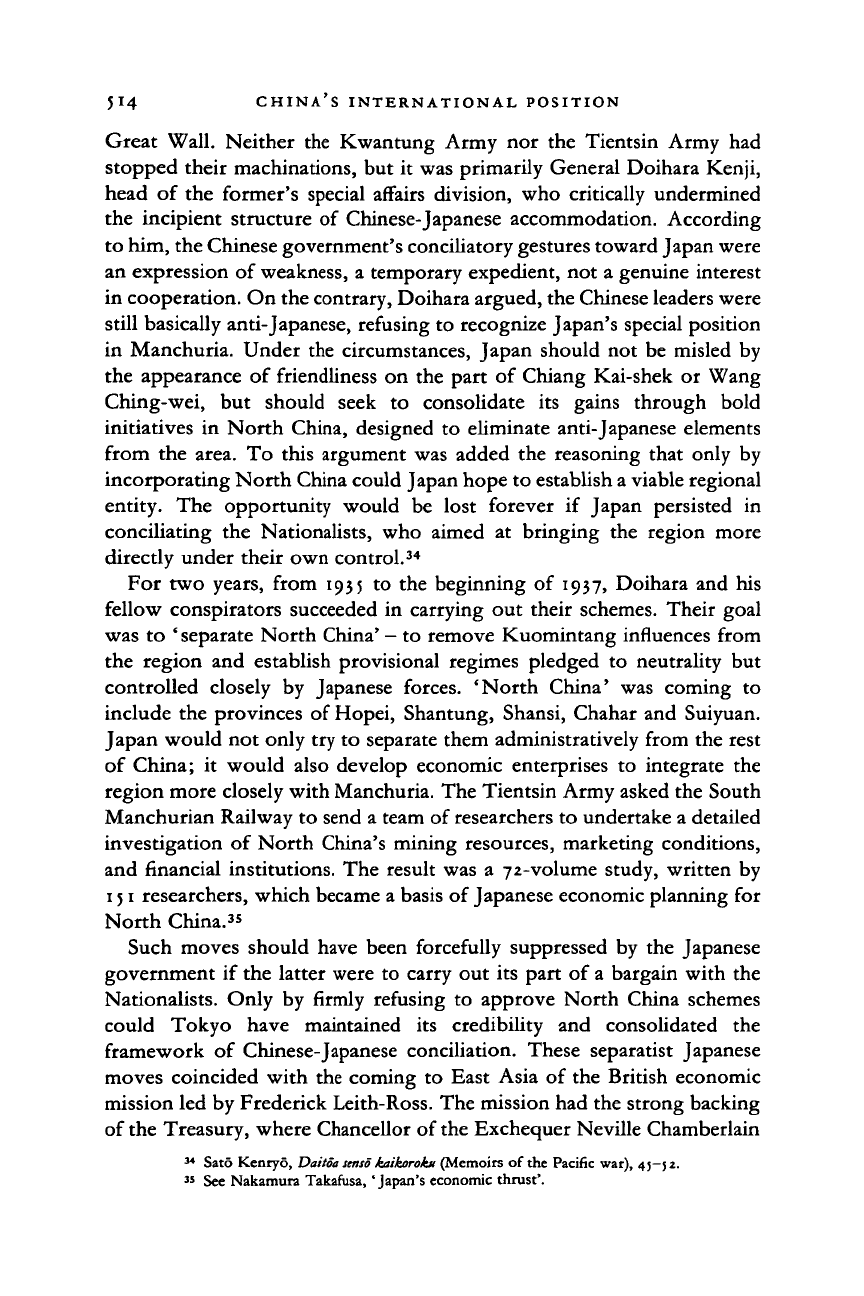
514 CHINA S INTERNATIONAL POSITION
Great Wall. Neither
the
Kwantung Army
nor the
Tientsin Army
had
stopped their machinations,
but it
was primarily General Doihara Kenji,
head
of the
former's special affairs division,
who
critically undermined
the incipient structure
of
Chinese-Japanese accommodation. According
to him, the Chinese government's conciliatory gestures toward Japan were
an expression
of
weakness,
a
temporary expedient,
not a
genuine interest
in cooperation. On the contrary, Doihara argued, the Chinese leaders were
still basically anti-Japanese, refusing
to
recognize Japan's special position
in Manchuria. Under
the
circumstances, Japan should
not be
misled
by
the appearance
of
friendliness
on the
part
of
Chiang Kai-shek
or
Wang
Ching-wei,
but
should seek
to
consolidate
its
gains through bold
initiatives
in
North China, designed
to
eliminate anti-Japanese elements
from
the
area.
To
this argument
was
added
the
reasoning that only
by
incorporating North China could Japan hope to establish a viable regional
entity.
The
opportunity would
be
lost forever
if
Japan persisted
in
conciliating
the
Nationalists,
who
aimed
at
bringing
the
region more
directly under their own control.
34
For
two
years, from 1935
to the
beginning
of
1937, Doihara
and his
fellow conspirators succeeded
in
carrying
out
their schemes. Their goal
was
to '
separate North China'
—
to
remove Kuomintang influences from
the region
and
establish provisional regimes pledged
to
neutrality
but
controlled closely
by
Japanese forces. 'North China'
was
coming
to
include
the
provinces
of
Hopei, Shantung, Shansi, Chahar
and
Suiyuan.
Japan would
not
only
try to
separate them administratively from
the
rest
of China;
it
would also develop economic enterprises
to
integrate
the
region more closely with Manchuria. The Tientsin Army asked the South
Manchurian Railway
to
send
a
team
of
researchers
to
undertake
a
detailed
investigation
of
North China's mining resources, marketing conditions,
and financial institutions.
The
result was
a
72-volume study, written
by
151 researchers, which became a basis
of
Japanese economic planning
for
North China.
35
Such moves should have been forcefully suppressed
by the
Japanese
government
if
the latter were
to
carry
out its
part
of
a bargain with
the
Nationalists. Only
by
firmly refusing
to
approve North China schemes
could Tokyo have maintained
its
credibility
and
consolidated
the
framework
of
Chinese-Japanese conciliation. These separatist Japanese
moves coincided with
the
coming
to
East Asia
of
the British economic
mission
led by
Frederick Leith-Ross. The mission had the strong backing
of the Treasury, where Chancellor
of
the Exchequer Neville Chamberlain
34
Sato Kenryd, Daitoa senso kaikoroku (Memoirs
of
the Pacific war), 45-52.
35
See Nakamura Takafusa, 'Japan's economic thrust'.
Cambridge Histories Online © Cambridge University Press, 2008
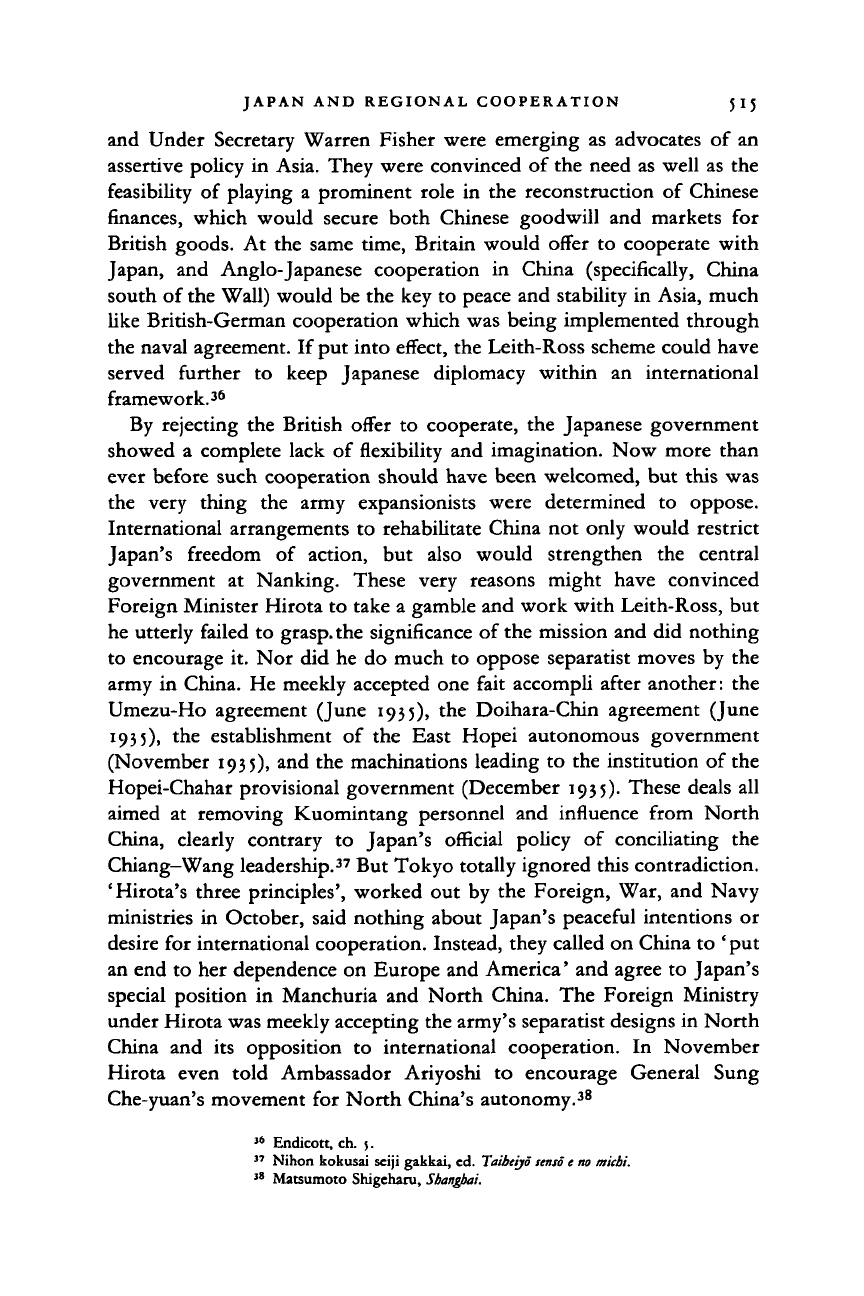
JAPAN AND REGIONAL COOPERATION 515
and Under Secretary Warren Fisher were emerging
as
advocates
of an
assertive policy
in
Asia. They were convinced
of
the need
as
well
as the
feasibility
of
playing
a
prominent role
in the
reconstruction
of
Chinese
finances, which would secure both Chinese goodwill
and
markets
for
British goods.
At the
same time, Britain would offer
to
cooperate with
Japan,
and
Anglo-Japanese cooperation
in
China (specifically, China
south
of
the Wall) would
be the
key
to
peace
and
stability
in
Asia, much
like British-German cooperation which was being implemented through
the naval agreement.
If
put into effect, the Leith-Ross scheme could have
served further
to
keep Japanese diplomacy within
an
international
framework.
36
By rejecting
the
British offer
to
cooperate,
the
Japanese government
showed
a
complete lack
of
flexibility
and
imagination.
Now
more than
ever before such cooperation should have been welcomed,
but
this
was
the very thing
the
army expansionists were determined
to
oppose.
International arrangements
to
rehabilitate China
not
only would restrict
Japan's freedom
of
action,
but
also would strengthen
the
central
government
at
Nanking. These very reasons might have convinced
Foreign Minister Hirota
to
take
a
gamble and work with Leith-Ross,
but
he utterly failed
to
grasp,
the significance
of
the mission
and did
nothing
to encourage
it. Nor did he do
much
to
oppose separatist moves
by the
army
in
China.
He
meekly accepted
one
fait accompli after another:
the
Umezu-Ho agreement (June 1935),
the
Doihara-Chin agreement (June
1935),
the
establishment
of the
East Hopei autonomous government
(November 1935),
and the
machinations leading
to the
institution
of
the
Hopei-Chahar provisional government (December 1935). These deals
all
aimed
at
removing Kuomintang personnel
and
influence from North
China, clearly contrary
to
Japan's official policy
of
conciliating
the
Chiang-Wang leadership.
37
But Tokyo totally ignored this contradiction.
'Hirota's three principles', worked
out by the
Foreign, War,
and
Navy
ministries
in
October, said nothing about Japan's peaceful intentions
or
desire
for
international cooperation. Instead, they called
on
China
to 'put
an
end to her
dependence
on
Europe
and
America'
and
agree
to
Japan's
special position
in
Manchuria
and
North China.
The
Foreign Ministry
under Hirota was meekly accepting the army's separatist designs
in
North
China
and its
opposition
to
international cooperation.
In
November
Hirota even told Ambassador Ariyoshi
to
encourage General Sung
Che-yuan's movement
for
North China's autonomy.
38
36
Endicott, ch.
5.
37
Nihon kokusai seiji gakkai, ed. Taibeiyo senso
e
no nticbi.
38
Matsumoto Shigeharu, Shanghai.
Cambridge Histories Online © Cambridge University Press, 2008
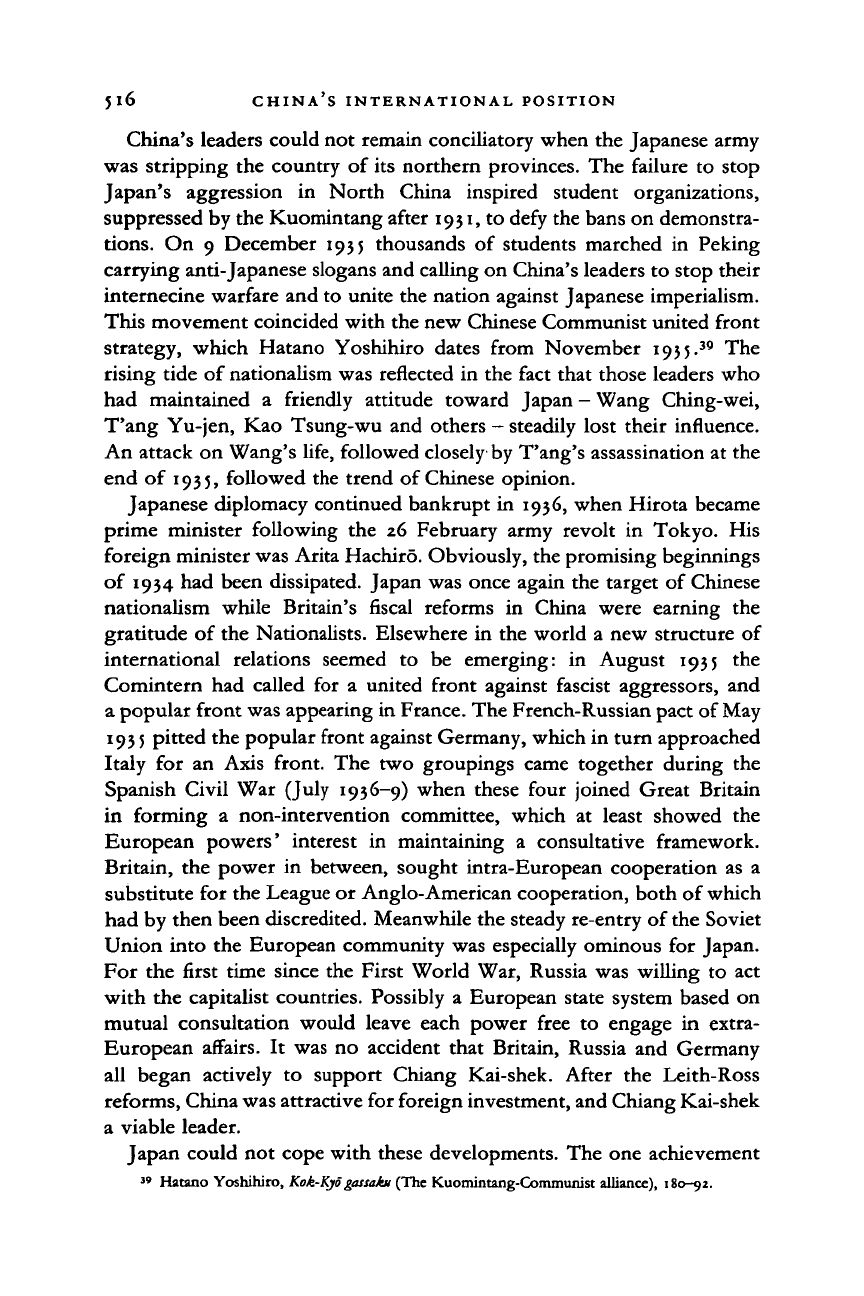
5 l6 CHINA'S INTERNATIONAL POSITION
China's leaders could not remain conciliatory when
the
Japanese army
was stripping
the
country
of
its northern provinces.
The
failure
to
stop
Japan's aggression
in
North China inspired student organizations,
suppressed by the Kuomintang after
1931,
to
defy the bans
on
demonstra-
tions.
On 9
December 1935 thousands
of
students marched
in
Peking
carrying anti-Japanese slogans and calling
on
China's leaders
to
stop their
internecine warfare and
to
unite
the
nation against Japanese imperialism.
This movement coincided with the new Chinese Communist united front
strategy, which Hatano Yoshihiro dates from November 1935.
39
The
rising tide
of
nationalism was reflected
in the
fact that those leaders
who
had maintained
a
friendly attitude toward Japan
—
Wang Ching-wei,
T'ang Yu-jen,
Kao
Tsung-wu
and
others
—
steadily lost their influence.
An attack
on
Wang's life, followed closely
by
T'ang's assassination
at the
end
of
1935, followed
the
trend
of
Chinese opinion.
Japanese diplomacy continued bankrupt
in
1936, when Hirota became
prime minister following
the 26
February army revolt
in
Tokyo.
His
foreign minister was Arita Hachiro. Obviously, the promising beginnings
of 1934
had
been dissipated. Japan was once again
the
target
of
Chinese
nationalism while Britain's fiscal reforms
in
China were earning
the
gratitude
of
the Nationalists. Elsewhere
in the
world
a
new structure
of
international relations seemed
to be
emerging:
in
August
1935 the
Comintern
had
called
for a
united front against fascist aggressors,
and
a popular front was appearing in France. The French-Russian pact of May
193 5
pitted the popular front against Germany, which
in
turn approached
Italy
for an
Axis front.
The two
groupings came together during
the
Spanish Civil
War
(July 1936-9) when these four joined Great Britain
in forming
a
non-intervention committee, which
at
least showed
the
European powers' interest
in
maintaining
a
consultative framework.
Britain,
the
power
in
between, sought intra-European cooperation
as a
substitute
for
the League
or
Anglo-American cooperation, both
of
which
had
by
then been discredited. Meanwhile the steady re-entry
of
the Soviet
Union into
the
European community was especially ominous
for
Japan.
For
the
first time since
the
First World War, Russia
was
willing
to act
with
the
capitalist countries. Possibly
a
European state system based
on
mutual consultation would leave each power free
to
engage
in
extra-
European affairs.
It was no
accident that Britain, Russia
and
Germany
all began actively
to
support Chiang Kai-shek. After
the
Leith-Ross
reforms, China was attractive for foreign investment, and Chiang Kai-shek
a viable leader.
Japan could
not
cope with these developments.
The one
achievement
39
Hatano Yoshihiro,
Kok-Kyo gassakx
(The Kuomintang-Communist alliance), 180-92.
Cambridge Histories Online © Cambridge University Press, 2008
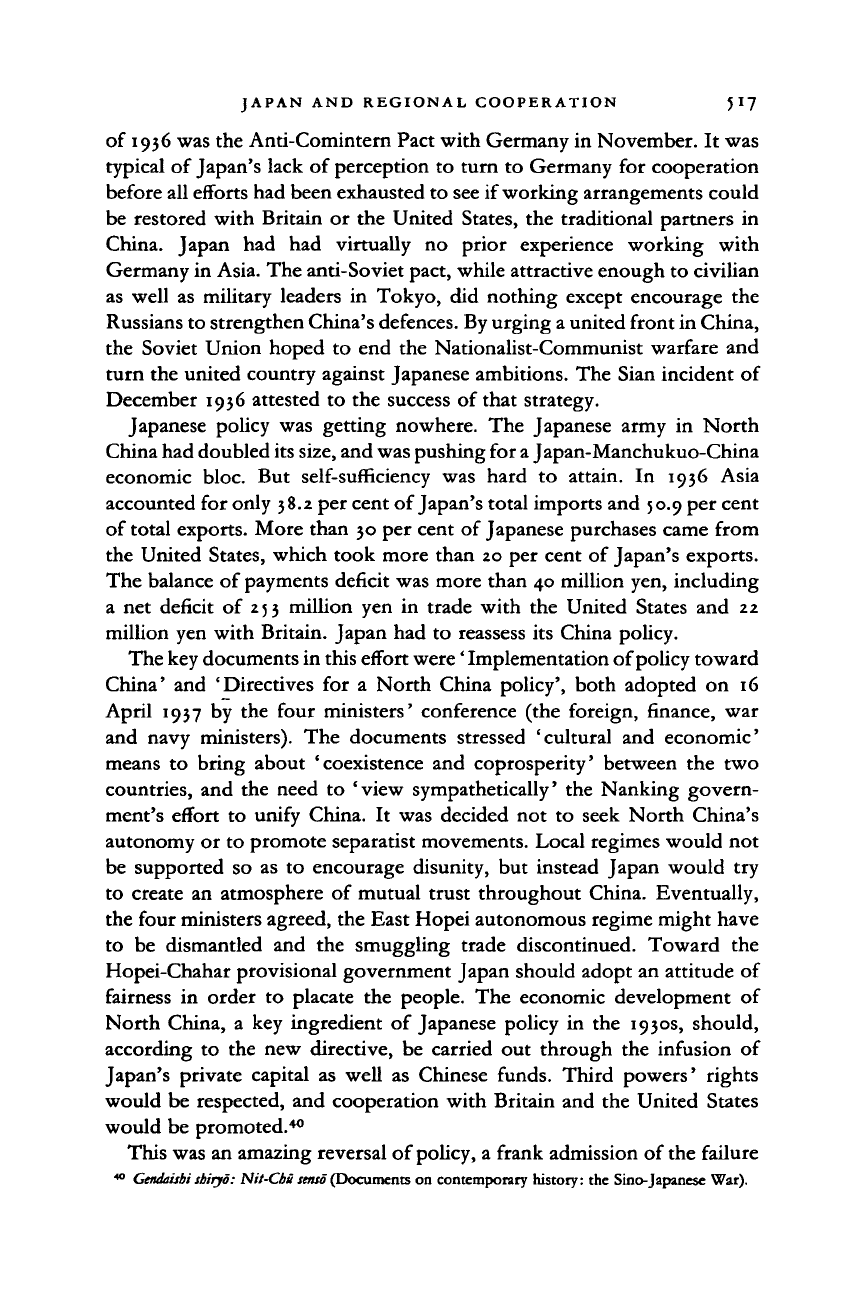
JAPAN AND REGIONAL COOPERATION
J
17
of 1936 was the Anti-Comintern Pact with Germany in November. It was
typical of Japan's lack of perception to turn to Germany for cooperation
before all efforts had been exhausted to see if working arrangements could
be restored with Britain or the United States, the traditional partners in
China. Japan had had virtually no prior experience working with
Germany in Asia. The anti-Soviet pact, while attractive enough to civilian
as well as military leaders in Tokyo, did nothing except encourage the
Russians to strengthen China's defences. By urging a united front in China,
the Soviet Union hoped to end the Nationalist-Communist warfare and
turn the united country against Japanese ambitions. The Sian incident of
December 1936 attested to the success of that strategy.
Japanese policy was getting nowhere. The Japanese army in North
China had doubled its size, and was pushing for
a
Japan-Manchukuo-China
economic bloc. But self-sufficiency was hard to attain. In 1936 Asia
accounted for only 38.2 per cent of Japan's total imports and 50.9 per cent
of total exports. More than 30 per cent of Japanese purchases came from
the United States, which took more than 20 per cent of Japan's exports.
The balance of payments deficit was more than 40 million yen, including
a net deficit of 253 million yen in trade with the United States and 22
million yen with Britain. Japan had to reassess its China policy.
The key documents in this effort were' Implementation of policy toward
China' and 'Directives for a North China policy', both adopted on 16
April 1937 by the four ministers' conference (the foreign, finance, war
and navy ministers). The documents stressed 'cultural and economic'
means to bring about 'coexistence and coprosperity' between the two
countries, and the need to 'view sympathetically' the Nanking govern-
ment's effort to unify China. It was decided not to seek North China's
autonomy or to promote separatist movements. Local regimes would not
be supported so as to encourage disunity, but instead Japan would try
to create an atmosphere of mutual trust throughout China. Eventually,
the four ministers agreed, the East Hopei autonomous regime might have
to be dismantled and the smuggling trade discontinued. Toward the
Hopei-Chahar provisional government Japan should adopt an attitude of
fairness in order to placate the people. The economic development of
North China, a key ingredient of Japanese policy in the 1930s, should,
according to the new directive, be carried out through the infusion of
Japan's private capital as well as Chinese funds. Third powers' rights
would be respected, and cooperation with Britain and the United States
would be promoted.
40
This was an amazing reversal of
policy,
a frank admission of the failure
40
Gendaisbi sbiryo: Nit-Cbu
senso
(Documents on contemporary history: the Sino-Japanese War).
Cambridge Histories Online © Cambridge University Press, 2008

5
l8 CHINA'S INTERNATIONAL POSITION
of the army's unscrupulous tactics of aggrandizement. Unfortunately, it
came too late. The Chinese had thoroughly lost confidence in Japanese
professions of mutual friendship; the Sian incident had unified the country
as never before. Chiang Kai-shek's authority now depended on taking
a strong stand against Japan. The international environment was also
moving in China's favour. By the beginning of 1937 the worst phase of
the global depression was over. The world's industrial output that year
was to surpass the level of 1929 for the first time, and the volume of trade
was also to regain its pre-1929 magnitude. Foreign economic questions
no longer preoccupied the diplomacy of the industrial powers. In London,
Paris,
Moscow and other capitals there was serious concern with pre-
venting war. Most important, President Franklin D. Roosevelt, whose
foreign policy during 1953—7 had been nationalistic, uncooperative and
inconsistent, was willing to go back to the Hoover-Stimson strategy of
internationalizing regional disputes. Critical of the neutrality legislation,
he was convinced that America once again must take a lead in world affairs.
Roosevelt invited Neville Chamberlain, shortly after he became prime
minister in June, to come to Washington to discuss world problems.
Under-Secretary of State Sumner Welles, with Roosevelt's backing, called
for an international conference to lay down basic principles for the
guidance of all nations. While nothing came of these proposals, they
indicated the beginning of America's return to the international arena.
41
In Europe this revival of internationalism was to culminate in the
Munich compromise of 1938 which, as Welles was to characterize it,
seemed to establish 'a new world order based upon justice and upon law'.
Just as in East Asia during 1931-2, the years 1937-8 were the heyday of
a new internationalism which was sometimes called ' appeasement'. It was
an expression of the major powers' interest in avoiding war, albeit at the
expense of smaller countries. In Asia in 1937, however, there was much
less inclination among the Western powers to appease Japan, that is, to
cooperate with Japan to stabilize political relations. Japan had become
more of an outsider than Germany, more obviously an aggressor. The
Japanese government needed to take energetic steps if it was going to
persuade other powers of its commitment to its new China policy.
Restoring a sense of international cooperation in East Asia in fact was
the cardinal objective of the ministry of Konoe Fumimaro who came to
power on 4 June 1937. Hirota was reappointed foreign minister, and it
was to have been their principal goal to put an end to Japan's diplomatic
isolation. At that very juncture the Marco Polo Bridge incident destroyed
any prospect for peace and stability in Asia.
The shooting outside Peiping on 7 July had not been premeditated,
41
Arnold A. Ofiher, American
appeasement:
United States foreign policy and Germany,
rf)j-rfjX.
Cambridge Histories Online © Cambridge University Press, 2008
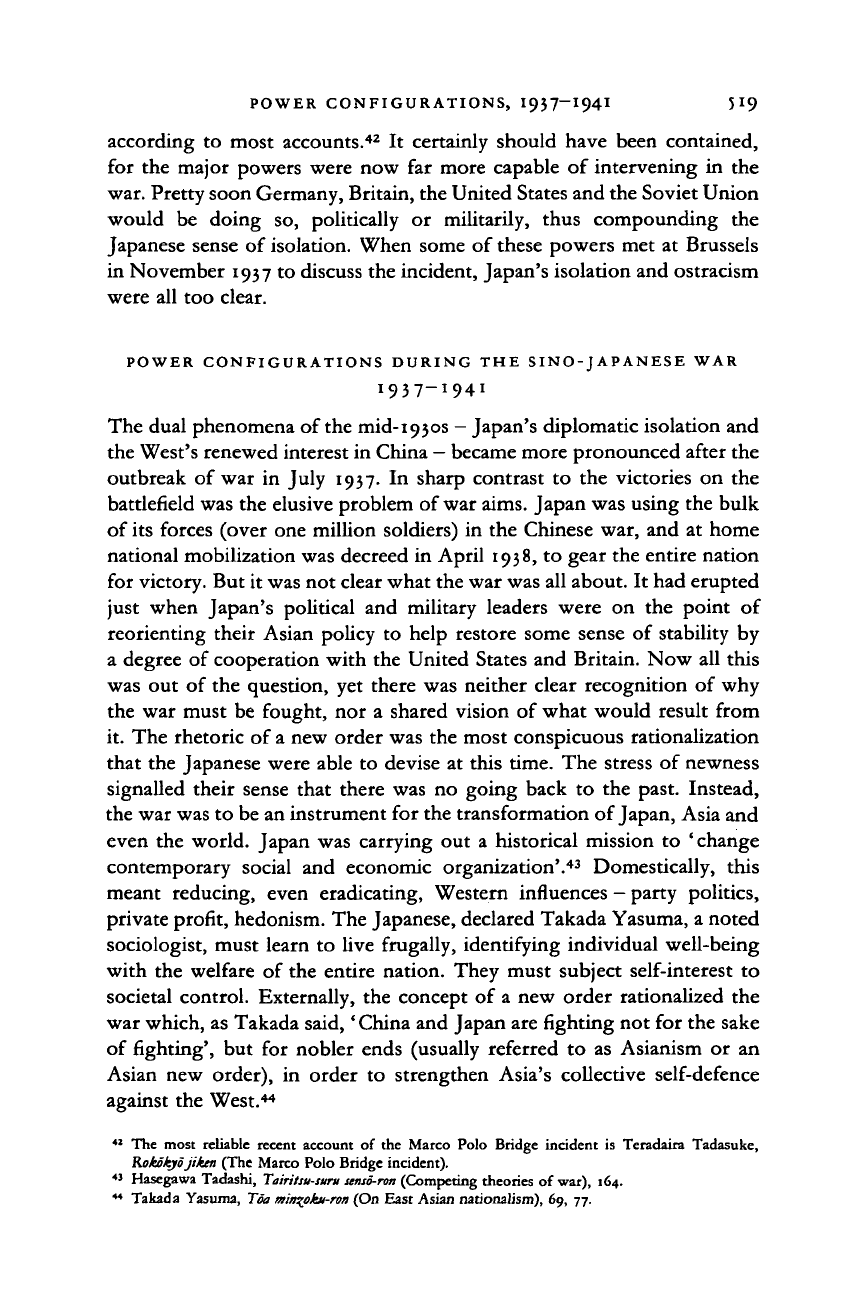
POWER CONFIGURATIONS, I937-I94I 519
according
to
most accounts.
42
It
certainly should have been contained,
for
the
major powers were
now far
more capable
of
intervening
in the
war. Pretty soon Germany, Britain, the United States and the Soviet Union
would
be
doing
so,
politically
or
militarily, thus compounding
the
Japanese sense
of
isolation. When some
of
these powers
met at
Brussels
in November 1937
to
discuss the incident, Japan's isolation and ostracism
were
all too
clear.
POWER CONFIGURATIONS DURING THE SINO-JAPANESE WAR
The dual phenomena
of
the mid-i93os
-
Japan's diplomatic isolation
and
the West's renewed interest in China
—
became more pronounced after the
outbreak
of
war
in
July 1937.
In
sharp contrast
to the
victories
on the
battlefield was the elusive problem
of
war aims. Japan was using the bulk
of its forces (over one million soldiers)
in the
Chinese war,
and at
home
national mobilization was decreed
in
April 1938,
to
gear the entire nation
for victory. But
it
was not clear what the war was all about.
It
had erupted
just when Japan's political
and
military leaders were
on the
point
of
reorienting their Asian policy
to
help restore some sense
of
stability
by
a degree
of
cooperation with
the
United States
and
Britain. Now
all
this
was
out of
the question,
yet
there was neither clear recognition
of
why
the
war
must
be
fought,
nor a
shared vision
of
what would result from
it.
The
rhetoric
of
a new order was
the
most conspicuous rationalization
that
the
Japanese were able
to
devise
at
this time.
The
stress
of
newness
signalled their sense that there
was no
going back
to the
past. Instead,
the war was
to
be an instrument
for
the transformation of Japan, Asia and
even
the
world. Japan was carrying
out a
historical mission
to
'change
contemporary social
and
economic organization'.
43
Domestically, this
meant reducing, even eradicating, Western influences
—
party politics,
private profit, hedonism. The Japanese, declared Takada Yasuma, a noted
sociologist, must learn
to
live frugally, identifying individual well-being
with
the
welfare
of
the entire nation. They must subject self-interest
to
societal control. Externally,
the
concept
of
a
new
order rationalized
the
war which,
as
Takada said,' China and Japan are fighting not
for
the sake
of fighting',
but for
nobler ends (usually referred
to as
Asianism
or an
Asian
new
order),
in
order
to
strengthen Asia's collective self-defence
against
the
West.
44
41
The
most reliable recent account
of
the
Marco Polo Bridge incident
is
Teradaira Tadasuke,
Kokikyoj'tken (The Marco Polo Bridge incident).
43
Hasegawa Tadashi, Tairitsu-suru senso-rm (Competing theories
of
war), 164.
44
Takada Yasuma, Toa min^pku-ron (On East Asian nationalism), 69,
77.
Cambridge Histories Online © Cambridge University Press, 2008
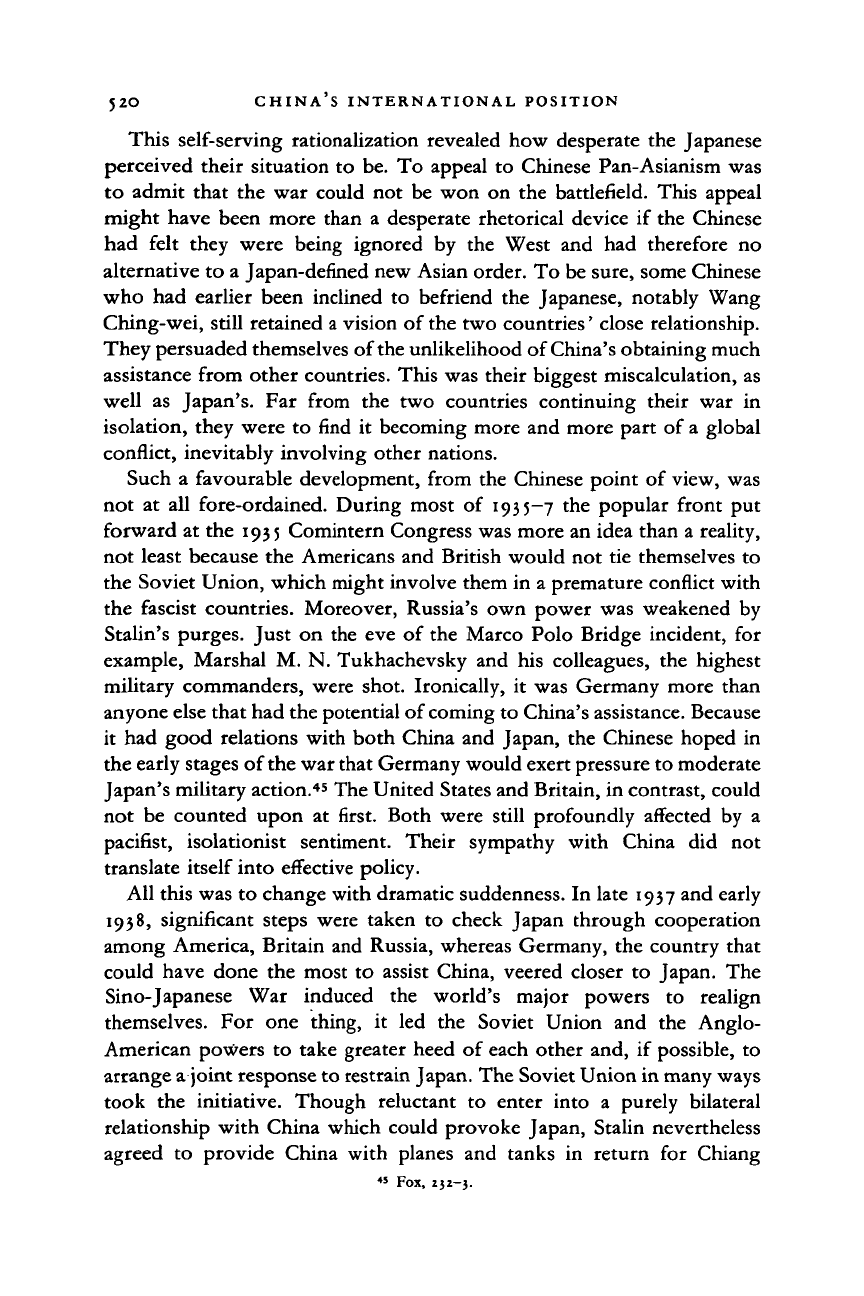
520 CHINA S INTERNATIONAL POSITION
This self-serving rationalization revealed how desperate the Japanese
perceived their situation to be. To appeal to Chinese Pan-Asianism was
to admit that the war could not be won on the battlefield. This appeal
might have been more than a desperate rhetorical device if the Chinese
had felt they were being ignored by the West and had therefore no
alternative to a Japan-defined new Asian order. To be sure, some Chinese
who had earlier been inclined to befriend the Japanese, notably Wang
Ching-wei, still retained a vision of the two countries' close relationship.
They persuaded themselves of the unlikelihood of China's obtaining much
assistance from other countries. This was their biggest miscalculation, as
well as Japan's. Far from the two countries continuing their war in
isolation, they were to find it becoming more and more part of a global
conflict, inevitably involving other nations.
Such a favourable development, from the Chinese point of view, was
not at all fore-ordained. During most of 1935—7 the popular front put
forward at the 1935 Comintern Congress was more an idea than a reality,
not least because the Americans and British would not tie themselves to
the Soviet Union, which might involve them in a premature conflict with
the fascist countries. Moreover, Russia's own power was weakened by
Stalin's purges. Just on the eve of the Marco Polo Bridge incident, for
example, Marshal M. N. Tukhachevsky and his colleagues, the highest
military commanders, were shot. Ironically, it was Germany more than
anyone else that had the potential of coming to China's assistance. Because
it had good relations with both China and Japan, the Chinese hoped in
the early stages of the war that Germany would exert pressure to moderate
Japan's military action.
45
The United States and Britain, in contrast, could
not be counted upon at first. Both were still profoundly affected by a
pacifist, isolationist sentiment. Their sympathy with China did not
translate itself into effective policy.
All this was to change with dramatic suddenness. In late 1937 and early
1938,
significant steps were taken to check Japan through cooperation
among America, Britain and Russia, whereas Germany, the country that
could have done the most to assist China, veered closer to Japan. The
Sino-Japanese War induced the world's major powers to realign
themselves. For one thing, it led the Soviet Union and the Anglo-
American powers to take greater heed of each other and, if possible, to
arrange a joint response to restrain Japan. The Soviet Union in many ways
took the initiative. Though reluctant to enter into a purely bilateral
relationship with China which could provoke Japan, Stalin nevertheless
agreed to provide China with planes and tanks in return for Chiang
45
Fox, 252—3.
Cambridge Histories Online © Cambridge University Press, 2008
